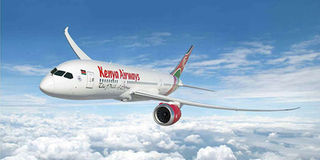Fresh turbulence for KQ as coronavirus grounds most flights

A KQ plane on flight. Kenya Airways will now only fly domestic routes as it moves to adhere to the international flights ban imposed by the government on March 22, 2020. PHOTO | FILE | NATION MEDIA GROUP
What you need to know:
- The government will have to resuscitate Kenya Airways, KQ, after international flight suspension.
- Prior to the international flight suspension, KQ said it had been forced to reduce its network by over 70 per cent.
The national carrier, Kenya Airways, will need a miracle in the form of government bailout as it flies head-on into the coronavirus storm, which has since seen it ground its fleet on international routes.
The government will have to resuscitate Kenya Airways, KQ, after international flight suspension, given that grounding of the fleet will see it bleed more money than it generates, sending the airline back into uncertain financial waters.
As it is, KQ will from Wednesday lose revenue everyday its aircraft remain grounded, with costs directly associated with leasing and workers pay.
SUSPEND SERVICES
The airlines’ acting CEO Allan Kilavuka said they will temporarily suspend all international services effective midnight March 26, until further notice.
“We will continue to operate cargo flights particularly so that we are available to offer emergency services or much needed supplies. In the meantime, our domestic flights to Mombasa and Kisumu remain operational,” Mr Kilavuka said, adding: “We hope that we will come back stronger than ever in due course.”
Prior to the international flight suspension, KQ said it had been forced to reduce its network by over 70 per cent and it had become increasingly difficult to continue offering international passenger services.
Last year, it emerged that the national carrier spend Sh14.87 billion to service the onerous leasing contracts it signed with financiers to acquire 20 aircraft.
Through a confidential report submitted to Parliament’s Transport committee last year, it emerged that KQ’s servicing of loans accounted for up to 11 per cent of the airline’s operating costs — way above the global average of five per cent — something that is now bound to bite, as its fleet remain grounded.
FINANCIAL SUPPORT
In January, National Treasury Cabinet Secretary Ukur Yatani said had intimated that the government was working on an extra financial support package for the airline.
“We are indeed committed in supporting Kenya Airways turnaround strategy and forthcoming nationalisation, which includes giving it state financial support. The airline is critical to us and we cannot afford to lose it. We have a plan and are working on looking for resources to inject,” Mr Yatani said.
This will have to come in quicker if the airline is to weather the storm that is about to hit its books.
Before the coronavirus pandemic hit the global aviation sector, grounding it to a near halt, Kenya Airways had indicated that it needed Sh45 billion to have its operations back to the green, its chairman Michael Joseph had said.
Now this does not seem feasible enough as KQ will require more funds to cushion it from the latest hit, even as its performance for this year is expected to plummet.
In the first half of 2019, the airline saw high debt push it to a loss of Sh8.56 billion shillings. The airline’s revenues for last year stood at Sh58.8 billion, against an operating cost of Sh67.11 billion.
LOST SH1 BILLION
Kenya Airways corporate communications manager Dennis Kashero told the Nation that the airline had lost over Sh1 billion since end of January when it suspended its flights to China, adding that it had been recording a decline in passenger and cargo numbers especially to and from Europe and part of Asia which has been affected by the coronavirus pandemic.
“In terms of the overall revenue impact, we are looking at about Sh800 million per month, for both passenger and cargo. China is a key cargo origin as well as a main feeder to the regional freighters. The schedule cancellation has therefore negatively impacted the revenue and volumes,” Mr. Kashero said before the airline announced the suspension of international flights.
The airline had been trying to cushion its operation, adjusting networks as it sought to keep a majority of its aircraft in the sky.
But the noose was tightening as countries including India, Nigeria, Rwanda, Uganda, South Africa, United Arab Emirates, where it flies started implementing a lockdown and international flights ban.
It was just a matter of time before the airline had to ground its fleet, a majority of which remain on lease.
FOLLOW: The Coronavirus Tracker




